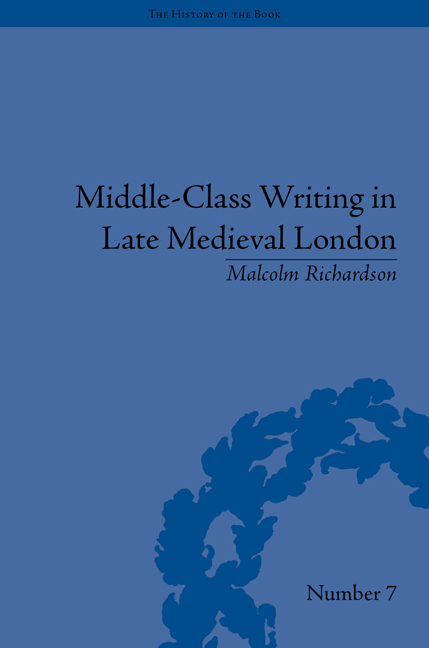Book contents
- Frontmatter
- CONTENTS
- Acknowledgements
- List of Abbreviations
- List of Tables
- Introduction: Pirates and Pens
- 1 London Middle-Class Writing: The Institutional Bases
- 2 ‘An Inextricable Labyrinth’: The Major Genres of Civic Life
- 3 English Middle-Class Writing in the Earlier Fifteenth Century: The Vernacular Letters
- 4 Women's Letters and Men's Books
- Conclusions and Speculations
- Notes
- Works Cited
- Index
Conclusions and Speculations
- Frontmatter
- CONTENTS
- Acknowledgements
- List of Abbreviations
- List of Tables
- Introduction: Pirates and Pens
- 1 London Middle-Class Writing: The Institutional Bases
- 2 ‘An Inextricable Labyrinth’: The Major Genres of Civic Life
- 3 English Middle-Class Writing in the Earlier Fifteenth Century: The Vernacular Letters
- 4 Women's Letters and Men's Books
- Conclusions and Speculations
- Notes
- Works Cited
- Index
Summary
The fifteenth-century origins in England of what eventually came to be called ‘Humanism’ and of the arrival of the New Learning in England have been traced from many sources. Some of the usual cast of pioneering characters include William of Wickham, Humphrey Duke of Gloucester, Robert Flemyng, Cornelio Vitelli, William Grocyn and his pupils Thomas Linacre and William Latimer at Oxford, and so on, all familiar to students of the movement. I would suggest that another source of the inquiring spirit, if not the content, of the New Learning might be found in late medieval English mercantile culture, as represented in the writing experiences covered in this volume. This approach runs counter to our usual picture of late medieval bourgeois culture, for we usually see the late medieval merchant class and its organizations as exactly what the New Learning was supposed to deliver England from. The merchants are usually depicted, even by such sympathetic historians as Caroline Barron, as being narrowly protectionist, damagingly conservative, oppressive to labourers and their junior members alike, hostile to anyone outside the city walls, especially foreigners, increasingly eating away at the privileges of their female guild members and uninterested in education. Literary scholars dislike the merchants because they liked the wrong Canterbury Tales for the wrong reasons, or, as Ralph Hanna has argued, when they did appreciate Chaucer it was because he offered a safe counterbalance to the more radical critiques of society found in texts such as Piers Plowman.
- Type
- Chapter
- Information
- Middle-Class Writing in Late Medieval London , pp. 171 - 174Publisher: Pickering & ChattoFirst published in: 2014



